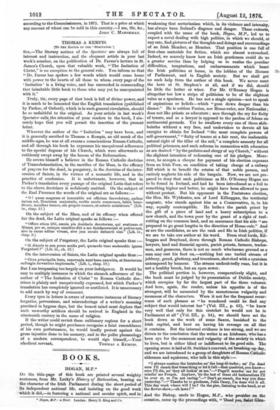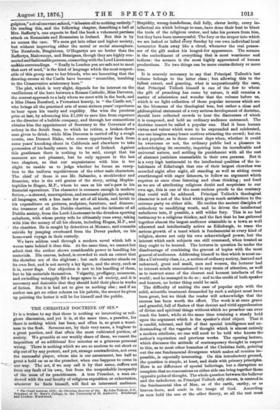BOOKS.
HOGAN, M.P.*
ON the title-page of this book are printed several weighty sentences, from Mr. Lecky's History of Rationalism, bearing on the character of the Irish Parliament during the short period of its independent national life, and insisting on the good work which it did,—in fostering a national and secular spirit, and in * Hogan, 11.P.: a Novel. London: Henry S. King and Co.
weakening that sectarianism which, in its violence and intensity, has always been Ireland's disgrace and danger. These extracts, coupled with the name of the book, Hogan, M.P., led us to expect a novel dealing with high politics, in which we should, at any rate, find pictures of the thoughts and doings and surroundings of an Irish Member, as Member. That position is one full of first-class materials for fiction, which are almost untouched.
Indeed, we scarcely know how an Irish gentleman could do us a greater service than by helping us to realise the peculiar difficulties, temptations, and embarrassments which beset the Irish politician at home, in the lobbies of the Houses Zia- of Parliament, and in English society. But we shall get no such help from the author of this book. We never meet the hero at St. Stephen's at all, and if we did, should be little the better or wiser. For Mr. O'Rooney Hogan is altogether too low a stripe of politician to be of the slightest value as a specimen. He has not a single opinion—not to speak of aspirations or beliefs—which "goes down deeper than his dinner." He is neither Fenian, nor Home-ruler, nor Nationalist ; does not like priests as educators ; sees through the cry for fixity of tenure, and as a lawyer is opposed to the pardon of felons on sentimental grounds. Yet he swallows every one of these shib- boleths without a wry face, and undertakes to devote all his energies to obtain for Ireland "the most complete powers of self-government," "fixity of tenure at a fair rent, the inalienable natural right of the tiller of the soil," a complete amnesty for all political prisoners, and such reforms in connection with education as are desired "by the prelates and clergy of my Church," without the slightest intention of redeeming one of his pledges. More- over, he accepts,a cheque for payment of his election expenses from an Irish Peer, on condition of taking charge of a railway Bill which is to benefit the estates of that noble person, and entirely neglects his side of the bargain. Now, we are not pre- pared to deny that such politicians as Mr. O'Rooney Hogan are to be found in Ireland, and had he been introduced as a foil to something higher and better, he might have been allowed to pass without protest. But his opponent in the Peatstown election, the Hon. Mr. Wyldoates, son of Lord Kilboggan, the territorial magnate, who stands against him as a Conservative, is, in his way, equally contemptible. He bribes the parish priest by the gift of a piece of land and a heavy subscription to a new church, and the town poor by the grant of a right of turf- cutting on the common land, and an assurance that his side "are prepared to go great lengths in the direction of Home-rule." And as are the candidates, so are the rank and file in Irish politics, if we are to take our author at his word. From rival lords, Kil- boggan and Brayhead, down through Roman Catholic Bishops, lawyers, land and financial agents, parish priests, farmers, trades- men, and gossoons, there is not so much wholesome ground as a man may rest his foot on,—nothing but one turbid stream of jobbery, greed, gluttony, and truculence, sketched with a cynicism nntempered by humour. The stream undoubtedly runs, but it is not a healthy brook, but an open sewer.
The political portion is, however, comparatively slight, and
the book must be judged by its presentation of Dublin society, which occupies by far the largest part of the three volumes. And here, again, the reader, unless his appetite is of the strongest, will be nauseated by the monotonous vulgarity and meanness of the characters. Were it not for the frequent recur- rence of such phrases as "he wondered could he find any
subject that would interest her" (VoL III., p. 42), "he knew very well that only for this crotchet he would not be in Parliament at all" (Vol. III., p. 54), we should have set the book down as the work of some Saxon, banished to the Irish capital, and bent on having his revenge on all that it contains. But the internal evidence is too strong, and we are driven to the conclusion that the writer is an Irishman, who has a keen eye for the meanness and vulgarity of the society in which he lives, but is either blind or indifferent to its good side. The opening scene is laid at St. Swithin's convent, on breaking-up day, and we are introduced to a group of daughters of Roman Catholic aldermen and squireens, who talk in this style :—
" I always confuse the latatudes an' the long-di-tudes • an' rm dead sure I'll smash that brass thing or let it fall—that quadrint, you know— sure I'll die, an' they all lookin' at me."—"Papall murder me for not mindin' me French. Anyhow, 'tis the last of these old botherations FU be ever at, so rm not caring."—" Don't go smash, the way you done yesterday."—" Thanks be to goodness, Julia Casey, I'm done wid it all. This day week where will I be? On the pier, listening to the band, or at the flower-show,—oh laws " And the Bishop, uncle to Hogan, M.P., who presides on the occasion, sums up the proceedings with, "'Deed yes, Saint Glen-
gulphus," a rival convent-schOol, " is beaten all to nothing entirely." On reading this, and the following chapter, describing a ball at Mrs. Rafferty's, one expects to find the book a vehement partisan attack on Romanista and Romanism in Ireland. But this is by no means the case. We soon get into other and higher society, but without improving either the moral or social atmosphere. The Bursfords, Bragintons, O'Hegartys are no better than the Raffertys, Malowneys, and Branigans, though they are highly con- nected and fashionable persons, consorting with the Lord Lieutenant an4his surroundings. "Really in London you are safe not to meet that sort of mud," is the kind of language which the most respect- able of this group uses to her friends, who are lamenting that the drawing-rooms at the Castle have become "scrambles, insulting to the Conservative aristocracy here." - The plot, which is very slight, depends for its interest on the vacillations of the hero between a Roman Catholic, Miss Davoren, the nearest approach to a lady whom we meet with in the book, and a Miss Diana Bursford, a Protestant beauty, in "the Castle set," who brings all the practised arts of some sixteen years' experience to bear upon his vanity and cupidity. She wins the precious prize at last, by advancing him 11,000 to save him from exposure as the director of a bubble company, and through her connections obtains him the appointment of Secretary to the Governor of a colony in the South Seas, to which he retires, a broken-down man given to drink; while Miss Davoren is carried off by a rough cousin, one Dermot Blake, who comes opportunely back from some years' knocking about in California and elsewhere to take possession of his family estate in the west of Ireland. Against this gentleman there is nothing to be said, except that his manners are not pleasant, but he only appears in the last two chapters, so that our acquaintance with him is too slight to enable us to judge whether he forms an excep- tion to the uniform repulsiveness of the other male characters. The chief of these is one Mr. Saltasche, a stockbroker and financier, who is the evil genius of the story, acting Mephis- tophiles to Hogan, M.P., whom he uses as his cat's-paw in his financial operations. The character is common enough in modern fietion,—a shrewd, unscrupulous, and successful gambler, speaking • all languages, with a fine taste for art of all kinds, and lavish in his expenditure on pictures, sculpture, furniture, and dinners ; the treasurer of all the Dublin charities, and the intimate of all Dublin society, from the Lord-Lieutenant to the drunken sporting subaltern, with whose pretty wife he ultimately runs away, taking with him the money of all his clients, including Hogan, M.P., and the charities. He is caught by detectives at Monaco, and commits suicide by jumping overboard from the Dover packet, on his homeward voyage in their custody.
We have seldom read through a modern novel which left a worse taste behind it than this. At the same time, we cannot but admit that the author shows considerable power in handling his materials. His canvas, indeed, is crowded to such an extent that the sketches are of the slightest ; but each character stands on its own feet, and is not merely a lay figure, and the story, such as it is, never flags. Our objection is not to his handling of them, but to his materials themselves. Vulgarity, profligacy, meanness, and swindling unhappily fill a large space in all society, and it is necessary and desirable that they should hold their place in works of fiction. But it is bad art to give US nothing else ; and if an author can get no other colours on his palette, the sooner he gives up painting the better it will be for himself and the public.































 Previous page
Previous page